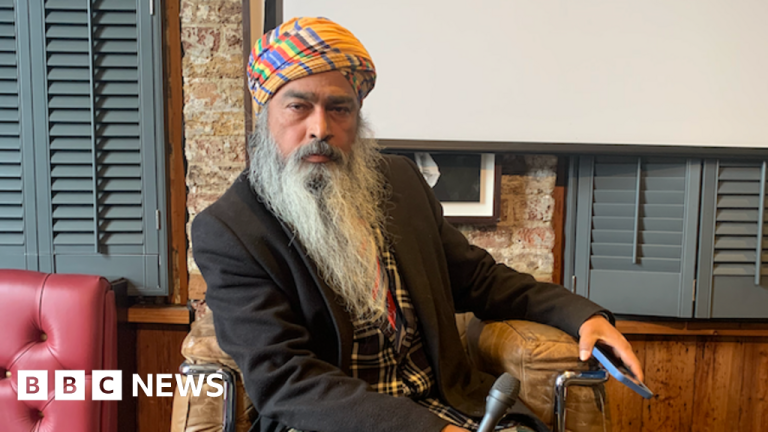BBC
Stephen Mollah is the latest person to claim to be the mysterious inventor of Bitcoin
Bitcoin is the basis of a two trillion dollar cryptocurrency industry, is now traded by the world's largest investment firms and is even an official currency in one country.
But despite its meteoric rise, a deep mystery remains at its heart: what is the true identity of its founder, the elusive Satoshi Nakamoto?
Many have tried to answer this question, but so far all have failed. In October, a high-profile HBO documentary suggested it was a Canadian Bitcoin expert called Peter Todd. The only problem: he said no, and the crypto world largely ignored him.
So, inevitably, ears perked up in our newsroom – and in the crypto world in general – when a call went out on Thursday that the mysterious creator of Bitcoin was to finally unmask himself at a press conference.
There is deep interest in the identity of Satoshi Nakamoto, in part because he is considered a revolutionary programmer who helped give birth to the crypto industry.
Their voice, opinions, and worldview would be hugely influential on an industry with such a dedicated and zealous fan base.
But the fascination also comes from the fact that as the holder of more than a million bitcoins, Satoshi would be a multi-billionaire, particularly because the price of the coins is currently close to a record level.
Given this immense wealth, it was somewhat unusual that the organizer of Thursday's press conference asked me to pay for my place at his grand opening.
A front row seat would cost £100. It was an extra £50 if I wanted unlimited questions. Organizer Charles Anderson even encouraged me to spend £500 in exchange for the privilege of interviewing “Satoshi” on stage.
I refused.
Mr Anderson said I could come any way, but warned there might not be room for me, such was the level of anticipation.
Actually, seating wasn't a problem.
The event took place in a private room at the prestigious Frontline Club.
Only a dozen journalists went to the prestigious Frontline Club, which interrupted proceedings at one point to emphasize that it was providing only a room and no official endorsement.
Very quickly it became clear that all participants were extremely skeptical.
After some research, it emerged that the organizer and the alleged Satoshi were currently embroiled in a complex legal battle over allegations of fraud – linked to claims that it was Satoshi.
It was an unpromising start and things only got worse from there.
Mr. Anderson invited “Satoshi” to come on stage.
A man named Stephen Mollah, who had been sitting silently off to the side the entire time, walked up and resolutely declared: “I am here to declare that yes: I am Satoshi Nakamoto and I created Bitcoin on the technology Blockchain. »
Over the next hour, reporters went from amused to irritated as he failed to provide any of the promised evidence to support his claims.
Mr. Mollah promised that he would make the decision to unlock and interact with the very first Bitcoins created – something only Satoshi could do.
But he didn't do it.
I left, accompanied by other perplexed journalists, taking with us any lingering doubts that this would prove to be yet another dead end in the quest to unmask Satoshi.
Not another
The list of those identified – unsuccessfully – as Satoshi Nakamoto is long.
In 2014, a high-profile article in Newsweek said he was Dorian Nakamoto, a Japanese American living in California.
But he denied it and the claim has been widely refuted.
A year later, Australian computer scientist Craig Wright was denounced by journalists under the name Satoshi.
He denied it before saying it was true – but for many years he failed to produce any evidence.
In the spring, the High Court in London ruled that Mr. Wright was not the inventor.
Reuters
Craig Wright has been claiming to be Satoshi Nakamoto since 2015
Tech billionaire and cryptocurrency enthusiast Elon Musk also denied being behind the cryptocurrency after a former employee of one of his companies, SpaceX, suggested it.
Which brings us to the question: does it really matter?
The current valuation of the crypto market means it is worth more than Google. And it seems inconceivable that the tech giant would play such an important role in our lives without people knowing who founded it and who owns a significant stake in the company.
Maybe there's a good reason for the real Satoshi to keep schtum. This stash of bitcoins would earn them an estimated value of $69 billion and their lives and character would no doubt be closely scrutinized if found.
Peter Todd, who was referred to by the HBO documentary as Satoshi, said the unwanted attention he received made him fear for his safety.
Many in the crypto world appreciate the fact that the mystery remains.
“No one knows who Satoshi is and that's a good thing,” Adam Back, one of its lead developers (and another potential Satoshi candidate) recently posted on X.
Bitcoin podcaster Natalie Brunell believes Satoshi's anonymity is not only deliberate but essential.
“By hiding his true identity, Satoshi ensured that Bitcoin did not have a leader or central figure whose personal agenda could influence the protocol,” she told me.
“This allows people to trust Bitcoin as a system, rather than trusting an individual or company.”
Carol Alexander, professor of finance at the University of Sussex – who lectures on the history of Bitcoin – is less sure.
According to her, the circus around the identity of Satoshi Nakamoto distracts from people looking at – and tackling – the more serious question of how cryptocurrencies could disrupt the functioning of the economy .
Leaving the Frontline Club, it was difficult to assess the strange press event beyond the obvious.
For now – and perhaps forever – the search for Satoshi continues.

